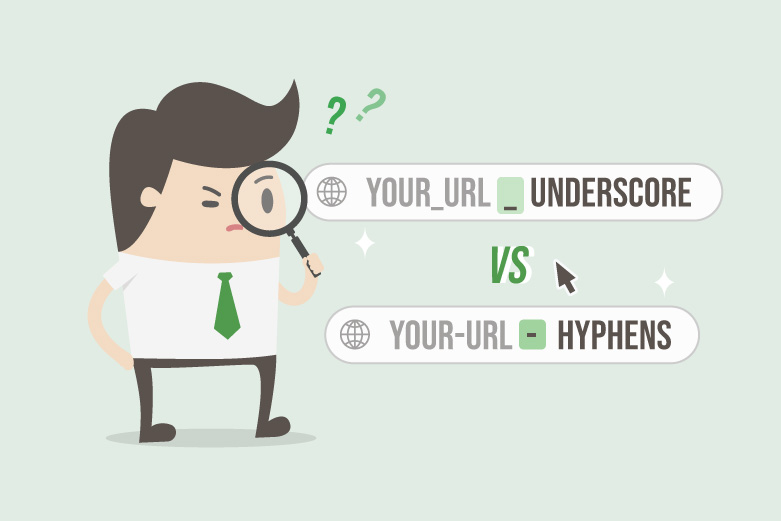
Do Underscores or Hyphens in URLs Affect SEO?
Ever wondered if a tiny dash in your URL could be the difference between being lost on the web and ranking at the top of search results?
It might seem trivial, but the choice between underscores and hyphens in URLs has sparked debates among SEO experts for years. Nailing down these seemingly small details about structured data is critical for any business wanting to enhance its online visibility. In 2025, do underscores and hyphens in URLs affect SEO?
What’s an SEO-Friendly URL?
The URL structure is like a digital address: it tells both users and search engines where to find your content.
A well-crafted URL is concise, descriptive, and includes relevant keywords. By maintaining a user-friendly approach, you indirectly encourage search engines to consider your content favourably. A study by Backlinko revealed that shorter URLs tend to rank better in Google search results than longer ones. This emphasises the value of simplicity and clarity when structuring URLs.
The Importance of URLs in SEO
URLs play an essential role in SEO, acting as both navigational tools for users and important signals for search engines. Here’s why they matter:
- Search Engine Crawling and Indexing: URLs help search engines understand the structure and hierarchy of a website. An organised URL structure makes it easier for search engines to crawl and index your content effectively, ensuring that your pages appear in relevant search results.
- User Experience and Engagement: A clear and descriptive URL provides users with a quick snapshot of the page content, enhancing clarity and trust. When users can easily interpret what a URL implies, it can lead to higher click-through rates and better engagement.
- Keyword Relevance: URLs can include targeted keywords that help signal the content’s relevance to search engines. Including meaningful keywords within URLs can improve the chances of ranking higher for specific search queries.
- Link Sharing and Social Media: URLs that are concise and easy to read are more likely to be shared and linked to by other sites and users. This can enhance your website’s exposure and generate inbound links, boosting your SEO efforts over time.
- Impact on Rankings: While URLs alone won’t determine a page’s ranking, they are one of the many factors that contribute to the overall SEO strategy. A well-optimised URL structure supports coherent site architecture, reinforces keyword strategies, and complements other SEO practices to improve a website’s visibility and authority.
Hyphens vs. Underscores: How Search Engines View Them
Search engines, particularly Google, treat hyphens (“-”) as spaces, which means they recognise hyphenated words as separate entities. This enhances the clarity of the keywords included in your URL.
On the other hand, underscores (“_”) are perceived as part of a single word, potentially diminishing keyword recognition. The preference for hyphens is reflected in Google’s official guidelines, and it’s widely adopted by SEO professionals.
What Does Google Recommend?
Google has made it clear: hyphens are preferable to underscores in URLs. Why? It ultimately boils down to how search engines work in indexing and ranking content.
By using hyphens, each word remains distinct, facilitating precise keyword targeting and improved search relevancy. Although the exact impact of URL punctuation may be small, in highly competitive markets, every detail counts. The cumulative effect of using hyphens can support better technical SEO over time.
Hyphens Enhance Keyword Recognition
Google treats hyphens as word separators. This means that when you use hyphens in your URLs, each word is treated as an individual keyword, making it easier for search engines to recognise and index them. This can enhance your content’s relevancy in search results.
Underscores Are Treated Differently
Conversely, when underscores are used, Google interprets them as connectors, essentially joining words into a single entity. This may obscure the distinct keywords within the URL, potentially affecting the precision of search results.
Aligning with Google’s Crawling Practices
Adopting hyphens aligns with Google’s established crawling and indexing practices. By utilising hyphens, you ensure that your URLs are readily understandable and searchable, aiding in better visibility and ranking potential in search results.
Therefore, Google’s official guidelines recommend using hyphens to separate words in URLs to enhance search engine optimisation and improve webpage indexing. While the impact on technical SEO may not be monumental, adhering to Google’s best practices can contribute positively to your site’s overall search performance.
Practical Tips for Your SEO Strategy
Creating an SEO-friendly URL isn’t just about avoiding underscores. Focus on clarity and brevity. Utilise hyphens to separate words, integrate meaningful keywords, and eliminate stop words like “a,” “and,” or “the.” Tools like Google Search Console can help monitor and adjust your URL strategy to align with best practices.
Do You Need to Change Current URLs?
Revising current URLs requires careful consideration. If they’re already performing well, alterations might not be necessary. However, if optimisation is needed, plan meticulously. Use 301 redirects to preserve your current rankings and avoid any abrupt traffic shifts.
The Human Element: User Experience Matters
- Readability and Perception: URLs that are easy to read can enhance user trust and click-through rates. When shared on social media or other platforms, URLs that clearly reflect the content of the page can engage more users. Hyphens make this readability possible, which can ultimately improve user experience.
- Social Sharing and Link Building: When URLs are shared on social media, their clarity and presentation can affect user perception. A clean, hyphenated URL can look more authoritative and inviting compared to a cluttered one with underscores. In terms of link building, clear URLs are more likely to be linked to by other sites.
Google has a clear preference when it comes to URL structures: use hyphens instead of underscores. This recommendation is based on how Google’s search algorithms interpret and index words in a URL.
In the ever-competitive realm of SEO, even minor details like punctuation in URLs affect your online presence. Hyphens have proven to be more search engine-friendly, seamlessly separating keywords and aligning with user search intent. By adopting these insights, you can streamline your URL strategy and watch your site’s search visibility soar. Remember, a clear URL is more than just a link; it’s your site’s first impression on the web.
Embrace simplicity, and let every detail propel you toward SEO success!


